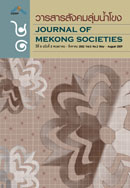Tactics of Everyday Life Practice of Cambodian-Lao Migrant Workers in Thailand in The Context of Mekong Regionalization
Main Article Content
Abstract
This paper analyzes the tactics of everyday life practice of migrant workers from the Cambodian and Lao border areas in Thailand in the context of Mekong regionalization. Its methodology is applying concepts of tactics of everyday life practice and minor transnationalism. Based on multi-sited ethnographic research, this paper found that state powers at the borderland, consumption of transnational media, and family play important roles in impelling villagers from the Cambodian and Lao border areas to migrate to Thailand. While living in Thailand, migrant workers need to develop and adapt by applying ‘flexible identities’, collaborating with their employers to avoid state victimization despite being exploited by them, creating social networks, consuming the modernity attached to Thai-ness, and creating a virtual reality via mobile phones. They are also an ‘agency’ as we can see their negotiation with their traditional and everyday life practice when they go back to their homeland. This paper argues that the concepts of tactics of everyday life practice and minor transnationalism are alternatives for studying a subordinated class in the context of globalization.


